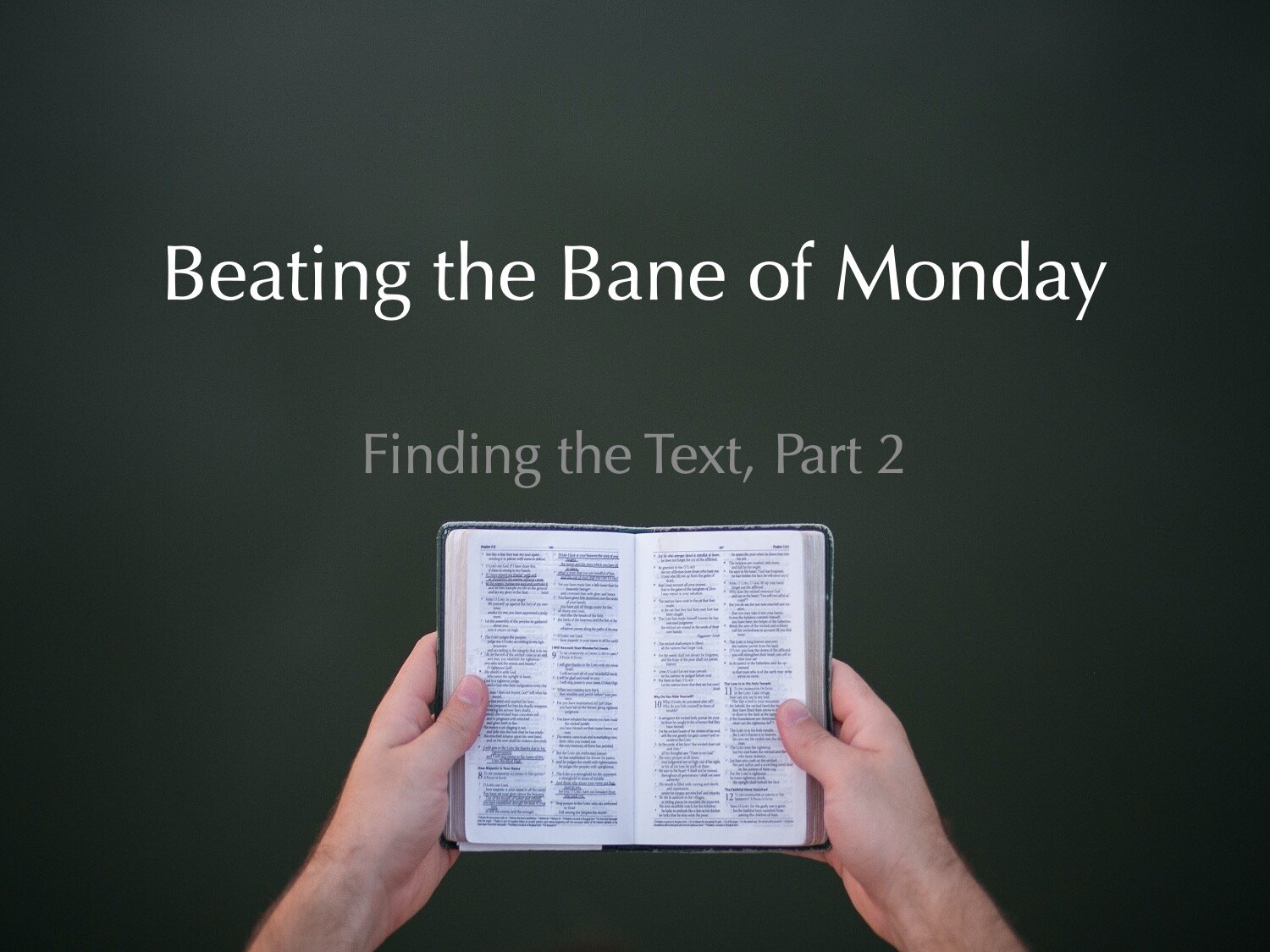Beating the Bane of Monday
I used to have a cartoon clipping on my desk portraying the weekly evolution of a pastor. It was a chart, patterned after those old “evolution of man” illustrations. On Monday, the pastor was collapsed like a puddle on the floor. On Tuesday, he was crawling. Each day he progressed a bit more until Sunday, when he was erect, composed, dressed and in his right mind, ready to take on the world. Then, on Monday, he was a puddle again, and the whole thing started over.
If you’re like me, you’ve experienced those Mondays. The highs and lows of Sunday have left you physically, mentally, emotionally, and perhaps even spiritually depleted. I’m pretty sure Jeremiah wrote Lamentations on a Monday. A lot of preachers I know take Monday off, but I never did — just because I didn’t want to spend my day off feeling so worn out. Besides, taking Monday off just postpones the inevitable. Yesterday’s sermon is history, but Sunday is only six days away. Better to go ahead and get back to work.
But I do want to avoid having to do anything on Monday mornings that requires creativity, clarity and mental energy — like choosing next Sunday’s sermon text. Monday is a good time to do exegesis, to trudge through commentaries and word studies–gathering the insights of others, not necessarily requiring insights of your own. If you have to choose a text for this week’s sermon, you’ll likely end up staring at the wall for hours on end.
How do you beat the bane of Monday? Choose your text well before you get there! In fact, take a personal planning retreat two or three times a year to plan several months of your preaching at a time. This way, on Monday, you’re always ready to go.
Planning your preaching several months (or even a year) at a time is a good idea for a lot of reasons, including relieving the stress of Monday morning. But selecting preaching texts shouldn’t begin at your planning retreat. It should be a daily concern expressed in two major rhythms: First, be attentive to what God is saying to you every day. Second, be disciplined to process and store those insights in a “sermon seedbed.” Then, when planning time comes, you not only have a seedbed of sermon ideas to get you started, but you also have a big-picture sense of how God is leading you as a preacher.
Choosing a sermon text begins with attentiveness to God’s Spirit every day. Here are four places to look for seeds to populate your sermon seedbed:
Your Devotional Life.
Some preachers have the impression that their devotional life should be completely separate from their sermon prep. Certainly, you shouldn’t substitute sermon prep for your own daily time with God. But your devotional life should impact your preaching, and vice versa. Insights and challenges God gives you in your time of prayer and Scripture reading should find their way into your sermon seedbed. Some may not become sermons, but many will. By the way, the truth of your weekly sermon should also find its way back into your devotional life as a part of your preparation — meditating on it and applying it to your own life before you preach it.
Your General Reading.
Cornelius Platinga makes a great case for a program of general reading in his book Reading for Preaching, which I reviewed here. The benefits of being a voracious reader are many. Not only can it provide you a steady stream of illustrations, sharpen your oral style, and give you wisdom, as Platinga says, but your reading can also be a source of ideas for your sermon seedbed. Read great books, cutting-edge essays, insightful articles — all with an eye for connecting Scripture to the issues they raise.
Your Observation of the World Around You.
An effective preacher is an attentive preacher — always alert, always learning, always observing. Pay attention to the culture around you, in all of its forms, from films to fads, best-sellers to billboards. Constantly ask yourself, “What story is this culture telling, and how does the gospel story encounter, subvert, and transform it?” But don’t stop there. Observe life in general — work, leisure, family, friendship, nature. How does the gospel speak to our deepest longings and most difficult struggles, our greatest victories and most exhilarating joys? These thought processes can lead you to ideas for your sermon seedbed that sparkle with relevance to your hearers.
Your Pastoral Ministry.
By no means should your counselling session on Tuesday become fodder for your sermon on Sunday! But your preaching should bear the marks of one who has a finger on the pulse of your people. Their doubts and their fears, their joys and their sorrows, their pressing needs and their nagging questions — all of these should be found woven into the fabric of your preaching in the form of answers, encouragement, comfort, confidence from God’s word. This takes alertness to God’s Spirit in the day-to-day rounds of pastoral ministry, searching and meditating on the Scriptures even as you walk with people in all the transitions, trials, and triumphs of their lives.
Attentiveness is only the beginning. You also have to process and store these ideas. Whether it is in a notebook you carry with you, an app on your cell phone, a daily journal, a folder in your filing cabinet, or a shoe box in your desk drawer — find a system that works for you, and use it.
For related thoughts, see my posts on what makes a good sermon text, cultivating sermon seeds, and the relationship between text and need.


